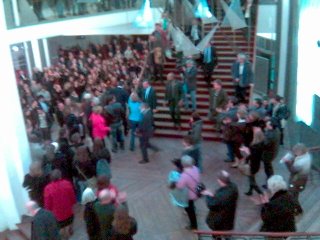Tuesday, February 13, 2007
François Bayrou in Strasbourg
We'd been waiting about an hour, comfortably seated in the Schweitzer amphitheater of Strasbourg's Palais des Congrés and serenaded by a couple of Romanian musicians. François Bayrou had been at the France 3 studio across the street recording a question-and-answer session. At 7:30, we were informed that he would only speak starting at 8:00, because the parliamentary television channel would be broadcasting live. We were more than 3,000 present, more than the amphitheater could hold. The music continued. Shortly before 8:00, a herd of photographers entered and settled on the front edge of the stage...good sign, I thought. Sure enough, people started clapping their hands, and some of my neighbors looked toward the door near us and said "C'est François Bayrou". I looked round, and sure enough.
I was just out of the frame to the left as he came down from the door, about four seats in in the last row: close enough to hear "Bon, on y va" when he was ready to go down to the stage.
Most of the first hour he dedicated to domestic issues: the changing role of education and of the university in particular; the changing employment environment, and the need to employ people longer (older) if they wish to work; the need to reduce, not increase, the national debt (and the apparent incompatibility of this with Sarkozy's and Royal's platforms). There was much more (obviously, that would hardly fill an hour!) but those were points I haven't heard other candidates address intelligently. He spoke of unemployment, underemployment, lack of career opportunities for highly educated researchers, and what he would do. While he didn't explicitly speak of constitutional changes to move to a 6th Republic, he did lament the current system, which was designed to fit one president at one exceptional time, and which amounts to electing a monarch with no accountability who in turn appoints the true executive. And he lamented the lack of effective power, and limited representativity of the parliament. He observed that in the past 25 years, the two "major" parties have alternated in power eight times, and with each switch the incomers undid whatever the outgoers had done, leading to a totally unproductive patchwork of reforms of reforms; he would seek to compose a more inclusive government, to get everyone pulling in the same direction (good luck!)--whence the slogan "La France de Toutes les Forces."
The second part of his talk was about Europe, his perception of what had gone wrong and what to do. This took about 40 minutes, and I won't try to summarize his argument. I'll just say that he described reasons why France needs Europe (and the world needs Europe) to tackle challenges too big and complex for France alone: defense, diplomacy, global warming, energy sourcing (natural gas, e.g., for which Russia is one of only three suppliers), immigration and co-development policy; and, first but not least, convergence of fiscal and budgetary policy, indispensable to countries sharing a common currency. He clearly has more vision of France's place in the world than what is taught Enarques. (When I visited the ENA a couple of years ago and our guide--an enarque--described the program and student body, I couldn't help thinking it was mis-named. It is called the National School of Administration, but should be the School of National Administration. Moving it from Paris to Strasbourg doesn't seem to have broadened the scope of reflection beyond the hexagon. Royal and Sarkozy are both ENA graduates.)
 The less-early-comers watched a projection in the lobby, but he did make a point of going down to see them in person (briefly) and shake hand (bain de foule) after his speech.
The less-early-comers watched a projection in the lobby, but he did make a point of going down to see them in person (briefly) and shake hand (bain de foule) after his speech.Official site article (in French) : bayrou-strasbourg
Tags: Bayrou : Strasbourg : France : Europe :



